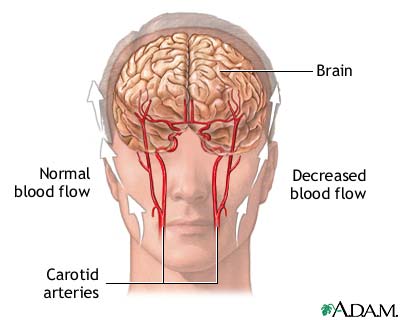


| Skip navigation | ||
 |
 |  |
|
|
||
Transient Ischemic attack (TIA)

A transient ischemic attack (TIA) is caused by a temporary state of reduced blood flow in a portion of the brain. This is most frequently caused by tiny blood clots that temporarily occlude a portion of the brain. A primary blood supply to the brain is through two arteries in the neck (the carotid arteries) that branch off within the brain to multiple arteries that supply specific areas of the brain. During a TIA, the temporary disturbance of blood supply to an area of the brain results in a sudden, brief decrease in brain function.
Update Date: 2/20/2007 Updated by: Updated by: A.D.A.M. Editorial Team: Greg Juhn, M.T.P.W., David R. Eltz, Kelli A. Stacy. Previously reviewed by Daniel Kantor, M.D., Director of the Comprehensive MS Center, Neuroscience Institute, University of Florida Health Science Center, Jacksonville, FL. Review provided by VeriMed Healthcare Network.(2006)

| Home | Health Topics | Drugs & Supplements | Encyclopedia | Dictionary | News | Directories | Other Resources | |
| Disclaimers | Copyright | Privacy | Accessibility | Quality Guidelines U.S. National Library of Medicine, 8600 Rockville Pike, Bethesda, MD 20894 National Institutes of Health | Department of Health & Human Services |
Page last updated: 20 October 2008 |